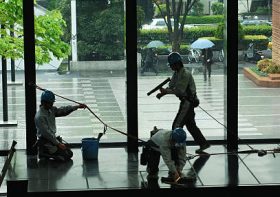In the Caribbean, colonialism and inequality mean hurricanes hit harder

The Caribbean, known for its pristine beaches and vibrant cultures, has long been a region grappling with the harsh reality of hurricanes. However, beneath the surface of these natural disasters lies a complex interplay of historical colonial legacies and present-day socio-economic inequalities, which together exacerbate the impact of hurricanes on the region. This essay explores how the historical legacy of colonialism and the persisting socio-economic disparities have created a vulnerable environment, making the Caribbean more susceptible to the devastating consequences of hurricanes.
Historical Legacy of Colonialism:
The Caribbean’s history is marked by centuries of European colonial rule, leaving a lasting imprint on the region’s socio-economic landscape. The exploitation of natural resources, forced labor, and cultural disruptions during colonial times have left the Caribbean in a state of structural vulnerability. The legacy of colonialism has manifested in the form of weak infrastructure, inadequate housing, and limited resources, amplifying the impact of hurricanes on the local population.
Economic Inequality:
Modern Caribbean societies continue to grapple with economic inequality, a consequence of historical injustices perpetuated by colonial powers. The concentration of wealth in the hands of a few exacerbates the vulnerability of marginalized communities during hurricane events. Unequal access to resources, education, and healthcare further widens the gap between the affluent and the disadvantaged, hindering the region’s overall resilience in the face of natural disasters.
Environmental Degradation:
Colonial powers exploited the Caribbean’s natural resources, leading to environmental degradation that has lasting consequences on the region’s ability to withstand hurricanes. Deforestation, pollution, and the depletion of natural barriers, such as mangroves and coral reefs, have left the Caribbean more susceptible to the destructive forces of hurricanes. The loss of these protective ecosystems amplifies the impact of storm surges and flooding, endangering both coastal communities and inland areas.
Inadequate Infrastructure:
The historical exploitation of the Caribbean has resulted in insufficient investment in infrastructure development. Many regions lack robust building codes, proper drainage systems, and resilient housing, leaving communities ill-prepared to face the onslaught of hurricanes. The lack of adequate infrastructure amplifies the damage inflicted by hurricanes, leading to increased casualties, displacement, and economic losses.
Social Vulnerability:
The socio-economic disparities rooted in colonial history contribute to social vulnerability during hurricane events. Marginalized communities often find themselves in poorly constructed housing, lacking access to evacuation resources, and facing inadequate disaster preparedness measures. As a result, these communities bear the brunt of the devastation, experiencing prolonged recovery periods and struggling to rebuild their lives in the aftermath of hurricanes.
Climate Change:
In recent decades, the Caribbean has witnessed an increase in the frequency and intensity of hurricanes, a trend exacerbated by climate change. While the entire region is affected, the unequal distribution of resources means that vulnerable communities are disproportionately impacted. The lack of adaptive capacity, driven by historical inequalities, leaves the Caribbean ill-equipped to cope with the evolving challenges posed by a changing climate.
Conclusion:
The Caribbean’s vulnerability to the devastating impacts of hurricanes is deeply rooted in its history of colonial exploitation and the persistent socio-economic inequalities that continue to shape the region. Addressing these issues requires a multifaceted approach, including investments in sustainable development, improved infrastructure, and policies aimed at reducing economic disparities. By recognizing and addressing the historical and contemporary factors contributing to vulnerability, the Caribbean can build a more resilient future in the face of increasingly severe hurricanes.




Leave a Reply